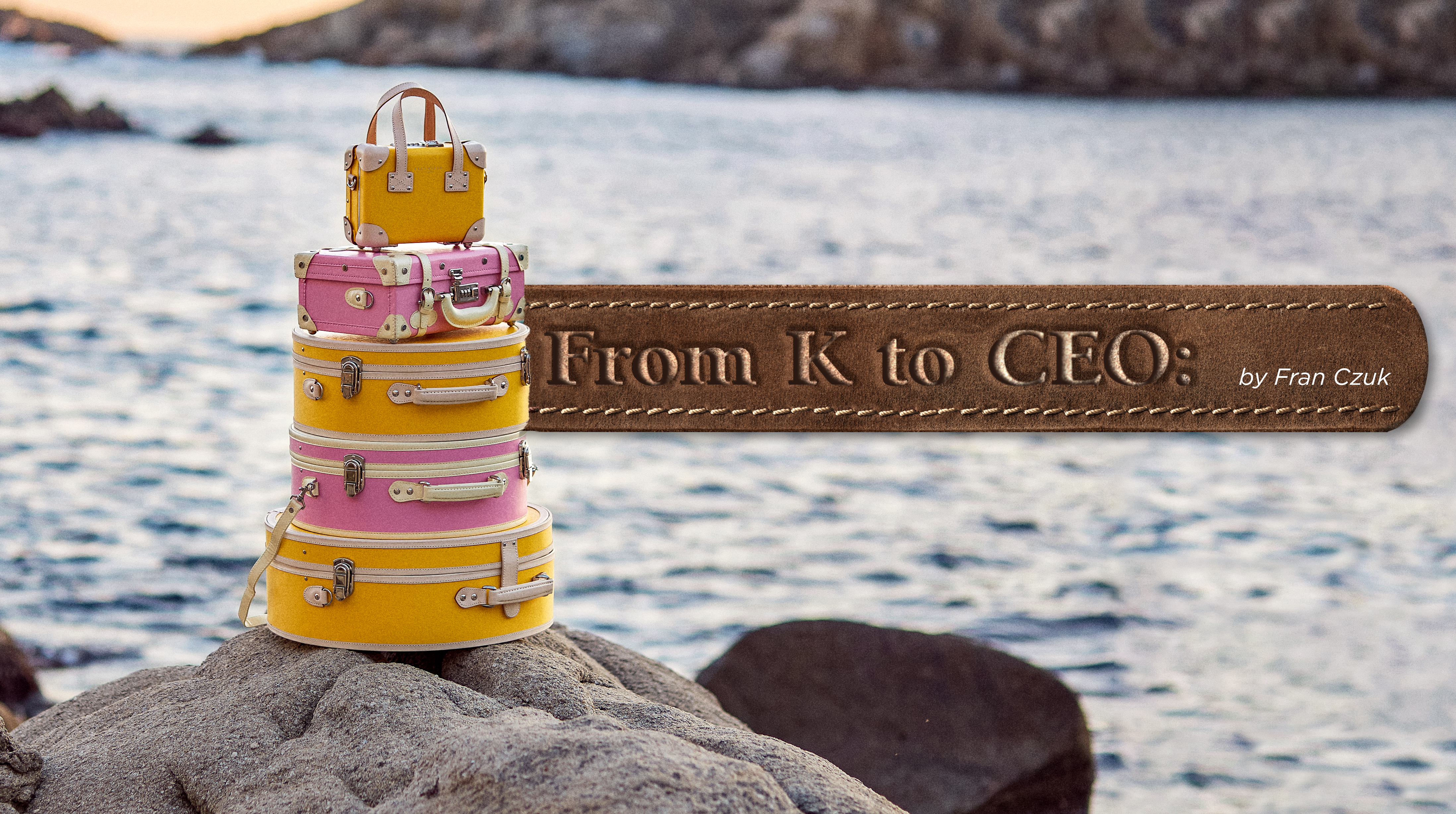
Sara Banks Turns Wanderlust
into Steamline Success
Come on, Barbie, let’s go … travel?
Barbie and SteamLine Luggage formed a match made in glamour heaven in the summer of 2023.
The May issue of Vogue magazine featured a photo shoot of Barbie movie star Margot Robbie, including a sunny snap of Robbie in a buttery dress surrounded by piles of SteamLine’s Correspondent Collection in canary yellow.
In June, Robbie was photographed arriving in Australia in a Barbie-inspired ensemble complete with a pink carryon and hat box combo from the luxury luggage company founded by Sara Banks ’02.
Then in July, when the Barbie movie was released, careful viewers could spot a SteamLine hatbox in Ken’s closet.
“We had this amazing trifecta,” Banks said. “Barbie’s production department pulled the luggage for props in the movie, and independently, Vogue pulled it for a photoshoot with Margot Robbie, with Anna Wintour herself approving the yellow, and Margot Robbie’s stylist pulled the pink for her tour as she promoted the film. That was really fun.
“It feels like a win when you get these external accolades from an industry you respect and people you admire.”
The path Banks has chosen, from student of psychology, English, Greek and theatre, to successful entrepreneur and CEO, may seem unconventional. Yet, Banks can point to many qualities Kalamazoo College nurtured in her that connect directly to crucial skills in business—as well as in parenthood, in travel and in life. In fact, “if I had gone to business school, I’m not sure I would have started SteamLine,” Banks said.
What it takes
So, if it doesn’t take business school to succeed in business, what does it take?
“A curiosity, careful listening, determination,” Banks mused. “Having a real vision for what you want to do and then going for it. Running your own business has a lot of parallels to life, in celebrating wins with humility, enjoying the ride, not being too stuck in your ways, not having a rigid mindset. In so many ways, K was the perfect environment for me to launch forth.”
In 2005, at 24 years old, Banks moved to Ireland with her future husband and took out a loan from her future father-in-law to start a small wholesale business, selling soft accessories such as scarves, shawls, and travel wear to boutiques throughout England and Ireland. Her goods represented a combination of items purchased in bulk on trips abroad, and original pieces she designed and had produced.
“When you set up something when you’re 24 or 25, it’s a lot of grit, a lot of hard work and a certain amount of naivety,” Banks said. “That experience was hugely influential; it gave me the courage to do everything else.”
Working a lot of trade shows, Banks noticed many women, flying in and out for the shows, would “come right off the airplane from their own countries with these beautiful handbags and coats, dressed to the nines—except they would have this boring luggage with them.” Banks saw an opportunity.
“I grew up in my grandmother’s closet,” she said. “She was a fashion designer in New York in the ’40s, and she had old trunks, old playbills from New York, the gloves, the hats, the shoes, everything. That was really part of my DNA. I developed a prototype of an old-fashioned steamer trunk with the trolley handles and with the wheels. The premise was bringing elegance back to travel for the modern-day explorer.”
Entrepreneurship was not yet the buzzword it would become; no one was peddling courses or incubators to get new businesses off the ground. Despite that, “when this luggage idea came along, I was so passionate about it,” Banks said. “I was gonna lump all of our savings into it—everything I’ve worked for in the previous business. My husband was like, ‘No, no, you’re crazy. You’re going from selling soft accessories like scarves to selling leather luggage. There’s a huge difference in price and commitment.’”
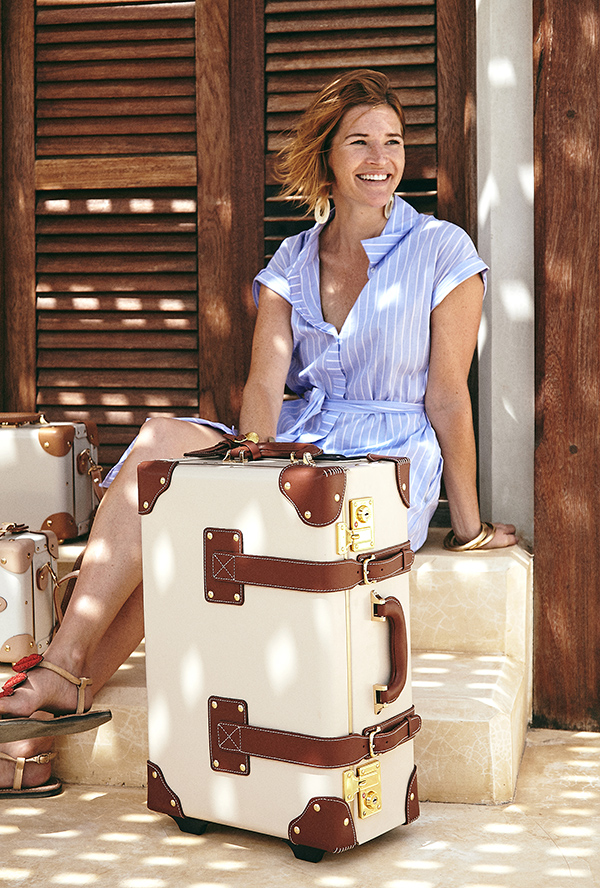
Determined to make her vision a reality anyway, Banks designed a prototype and had a set of luggage made. The next time they traveled together, Banks took the luggage and walked ahead through the airport.
“As soon as we got to the gate, he said, ‘OK, you have got to do this. Every single person has turned to look at your luggage.’ “That’s how SteamLine was born.”
Banks found many skills that had served her well in travel and in her first business were invaluable in launching SteamLine: “You tread softly, you listen, you have all your senses about you,” Banks said. “You can’t go in all brassy. You learn as you go. Stepping into a new environment, exploration, learning on your feet, that’s all very much a part of my ethos.”
Starting a business also called on the breadth of knowledge and experiences that Kalamazoo College values highly.
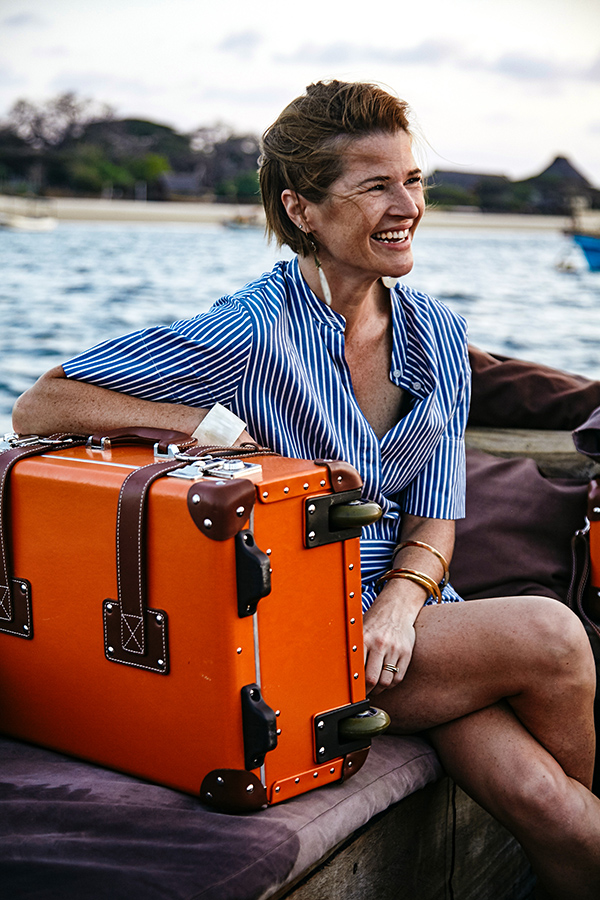
“In a liberal arts school like K, you can dabble in lots of subjects,” Banks said. “You can follow your passion in between a variety of subjects and themes, and you aren’t so focused on just learning one thing super well. That sort of diversity works as an entrepreneur and somebody running your own business. You have to wear a million hats. One day, or one hour, you’re wearing your finance cap, and then very quickly, the marketing cap, or the human resources cap. You have to dabble in all these different skill sets or areas. I think a liberal arts education like my experience really set me up for doing that kind of dance in business.”
Adapting to—and for—success
The company picked up steam as fashion and lifestyle publications, including Lucky magazine and online media company DailyCandy, began to feature the luggage.
“I don’t even know how they found out about us at the time,” Banks said. “I was focused on Europe and still in the wholesale model, and then DailyCandy contacted us and said, ‘Hey, we’re about to feature you, just to warn you your website might crash.’ When that happened, our website did crash, and then suddenly, we were picked up very quickly by Vogue, by Harper’s, by Architectural Digest; the press just went through the roof, because the luggage is very photogenic. It’s beautiful luggage. That launched us in this other business model completely, where we built a robust website and cut away the wholesale portion and moved to strictly e-commerce, direct to consumer and exporting to the States.”
The ability to pivot joined Banks’ list of skills crucial to travel, developed at K, and vital to business success. This skill would take center stage again in 2020, when SteamLine found itself—like so many companies—grappling with the impact of a border-closing pandemic.
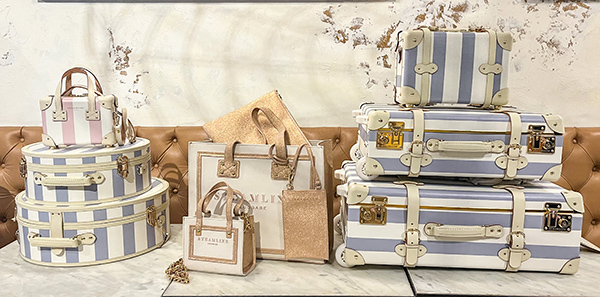
“COVID required really nimble thinking, and not being so set on learnings from the previous year,” Banks said. “All of a sudden, all your experiences of the last 10 years go out the window completely. You have no more targets. You have no idea what to expect. We had a lot of meetings and most everybody was able to stay positive and shift around and get creative, like, ‘OK, we are a travel company in a global pandemic. How can we weather this storm?’”
Successful pivots included promoting the luggage’s benefits as beautiful home storage and décor, as well as developing a mini handbag. In 2019, the brand sold about 70 percent luggage and 30 percent handbags; in 2020, those percentages reversed.
“We watched all these other luggage companies crumble,” Banks said. “Even though we were down 20 percent throughout COVID, we weathered the storm, and I think it was because we have that ability to be nimble in our thinking.”
Flexible thinking goes hand-in-hand with lifelong learning, another crossover skill between travel, liberal arts, business and life.
“I’ve learned lots of lessons in humility, and in knowing when to celebrate, or actually allowing yourself the ability to celebrate,” Banks said. “That’s something I probably learned the hard way, because you can run into tough times, and then it just feels like life is a slog because you didn’t celebrate the wins.”
For Banks, those wins include successful projects, like collaborations with other brands—including Clarks shoe company, fashion designer Kate Spade, contemporary clothing company Alice + Olivia, Canadian shoe designer John Fluevog and Burton Snowboards—concrete results, like hitting targets, and more abstract highs, like solid teamwork.
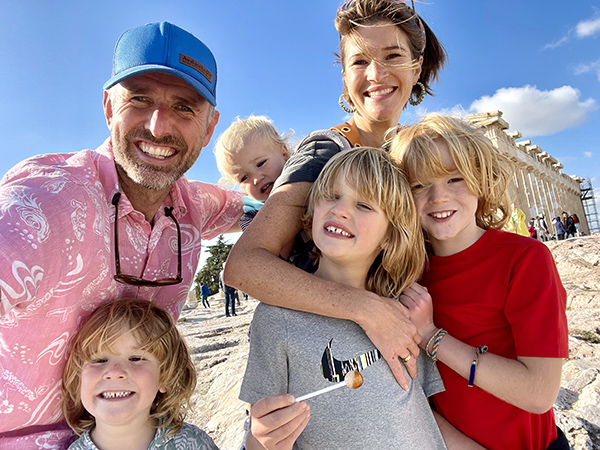
“It’s nice to celebrate and acknowledge that we’re doing this together and it’s working really, really well,” Banks said. “When my family spent two years traveling, we actually brought most of my core team with us to Mauritius (an island nation in east Africa), and that was really amazing. Some of them had never been to Mauritius, and we just spent a week on the beach and in a pool, and I thought, ‘This is a life high. Incorporating something I’m doing for fun, for my own soul, and being able to offer that to people I care about and work with.’”
Lifelong learning and flexible thinking are both invaluable as a business grows and changes.
“As you develop a business, you hit different benchmarks, and you can’t run a $10 million business as you would a $1 million business,” Banks said. “When you get to a certain volume where you can’t just do it all on your own, your first key hires are so important because you have to recognize what you’re good at and what you’re not good at. I used to do it all on my own, but it didn’t all come naturally to me. I’m not finance, I know that, I would outsource that. I hate talking about myself or pitching my brand, so hiring a PR team has been a large part of our success. As you grow, you get more specific about your skill sets and do what you feel you’re best at. At the same time, as a CEO or as a founder, you have that bird’s eye view. I’m not doing my brochures. I’m not setting up a trade show. You find really good talent, you put their butts on the seat. Having done it all, and then being able to hire somebody that’s better at it than you are and just help direct that ship, is so important. I’m still very curious. I still am risk taking, I’ve got guts and grit and vision, but I’m more willing to or at least more able to acknowledge the things I need help with.”
As she leans into her strengths, Banks notes that her favorite part of running SteamLine right now is creative design and collaboration.
“We’re introducing a new range of handbags for spring, which is really fun, because we haven’t done any soft luggage or totes,” Banks said. “Traveling with my family, of course we use the luggage, and then I was like, ‘Oh yeah, actually an airport tote would be really, really handy, because I use one and I need a way to keep all six passports together or a place to put my mobile phone that’s accessible.’ And so now we’re working with an Italian factory on this whole new range, which is a major departure for us considering we only did luggage—and do luggage really well—but now we’re branching out into this range of accessories.”
‘There’s a balance to it all’
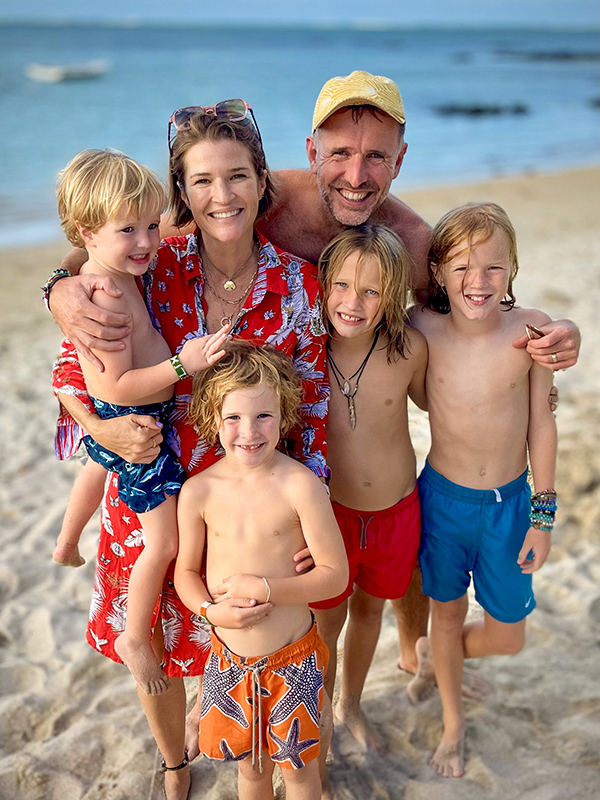
One imagines Barbie would be thrilled with the news. After all, Barbie is always well-dressed and accessorized in addition to successful in a variety of roles. And much of Barbie’s messaging—slogans such as “We girls can do anything”—rings true for Banks, even if, as Stereotypical Barbie discovers in the movie, life in the real world is a bit more complicated.
“I do believe you have to let certain things go in order to let certain things in,” Banks said. “I think there’s a balance to it all. And you have to be structured about it. I remember when my first son was born, I was trying to work from my phone as I was trying to play with a 4-month-old, and thinking, ‘I’m doing both things really badly. I’m not focusing on either one.’ I had to carve out time and put routines in place to say, when I’m here with the baby, I’m here with the baby. When I’m working, I’m working. With that said, I feel like, you know, you can. Yeah. You can have it all.”
That doesn’t mean it’s always easy.
“I’ve been operating SteamLine more like a lifestyle business,” she said. “It keeps me and my team afloat and alive. It also gives me a lot of freedom to do things that I desperately care about, like being part of my children’s lives, being able to travel when I want to. That balance of life works really well for me. I get to do it all in some ways: I get to run my business. I get to have my evenings with the children and take them to their sports. We have done a ferocious amount of traveling, which has all been wonderful and actually will oftentimes facilitate growth in areas of the business. But then cashflow can be a challenge for us. The luggage is expensive. It’s not an easy thing to produce. They’re all handmade, so we have these long lead times for production.”
Banks is not complaining, though.
“We all have our challenges. We all have our hard times and our bumps in the road, but I have an amazing family and an amazing support network and amazing friends, and I have had amazing experiences in life and getting to meet people in the world and also in running the business.”
In life as in business, Banks believes, “You might have to let certain things go; you might have to be very forgiving of yourself. You have to be very forgiving of others. I think you need to go easy. You can’t maybe be the best at everything. You might make mistakes. We’re all human. It probably sounds very pie in the sky; you’ll hear me later, and I’ll be like, ‘Oh my God. I’m screwing up everything today.’ We all have those moments. But I feel very fortunate. I feel very, very fortunate right now.”
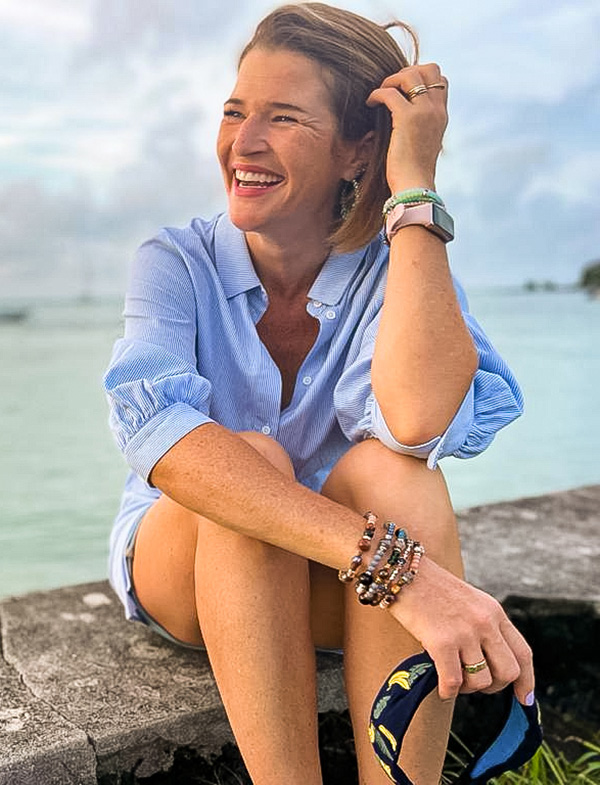
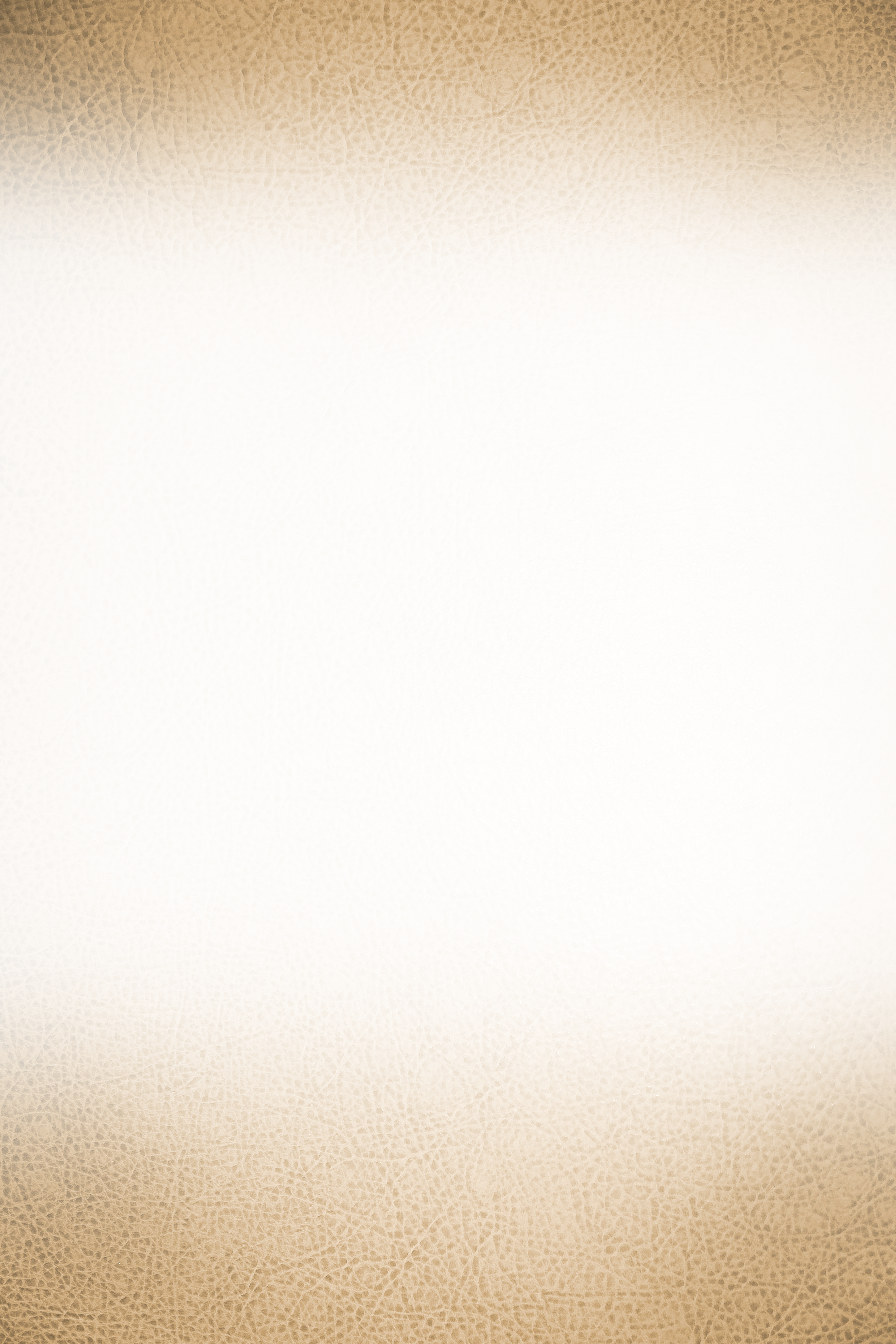
THE STORY BEHIND THE SUITCASES
A native of Superior, Wisconsin, who attended high school in Duluth, Minnesota, Banks ended up in Kalamazoo after visiting a best friend from high school theatre, who matriculated to K a year ahead of Banks.
“She gave me the tour and the sales pitch, and before you know it, I was going to K,” Banks said. “What I was really sold on about Kalamazoo was the study abroad program, because I knew I really, really wanted to travel.”
Taking full advantage of travel opportunities at K, Banks spent a summer theatre program in Greece, a semester in Philadelphia, and a year in Ireland, where she wrote her Senior Integrated Project on national identity through Irish theatre.
The study away experience in Philadelphia was “amazing and very shaping,” Banks said. “We got our own apartments, and I did a couple of internships with two different theatres for hands-on experience, which is really what I needed. I needed to see the world at that stage and I needed to apply and experience what I was learning.”
She majored in interdisciplinary studies, combining psychology and English, with a minor in Greek and an emphasis in theatre.
“I think that K offered a lot of freedom for students. Nobody ever told me that the path I was taking was unconventional or unorthodox or anything. It was all very supportive and nurturing. I think now that’s all we can do for kids, really. We can set them up with confidence to go forth, to let them feel that what they’re doing is good. They’ll make mistakes and they’ll trip up along the way, but to support and to give them that encouragement, I think, is what fosters genuine education and growth and learning, and I felt that in the K experience.
After graduation from K, Banks continued to travel and explore, working at a language school in Gloucester, Massachusetts, between long travel stints to Argentina and Chile. She traveled around India on motorbike with her future husband, whom she had met in Ireland, and they courted around the world before settling in Dublin.
“I said, go back to Ireland, get your life together, and maybe I’ll follow you,” Banks said. “Maybe. Then three months later, I pulled up stakes and moved to Ireland, and I have been here since.”
Banks, her husband, and their four boys—ages 11, 9, 7 and 4 as of this publication—recently spent two years traveling the world, an experience Banks credits with renewed energy, family closeness and genuine respect.
“We understand the facets of each other’s personalities really intimately,” Banks said. “I see in them this curiosity and respect for people everywhere, knowing that the world is a really big place out there, and there’s a lot of people that live differently than we do, yet there’s always a thread of commonality that you can find when you step out of your comfort zone.”
